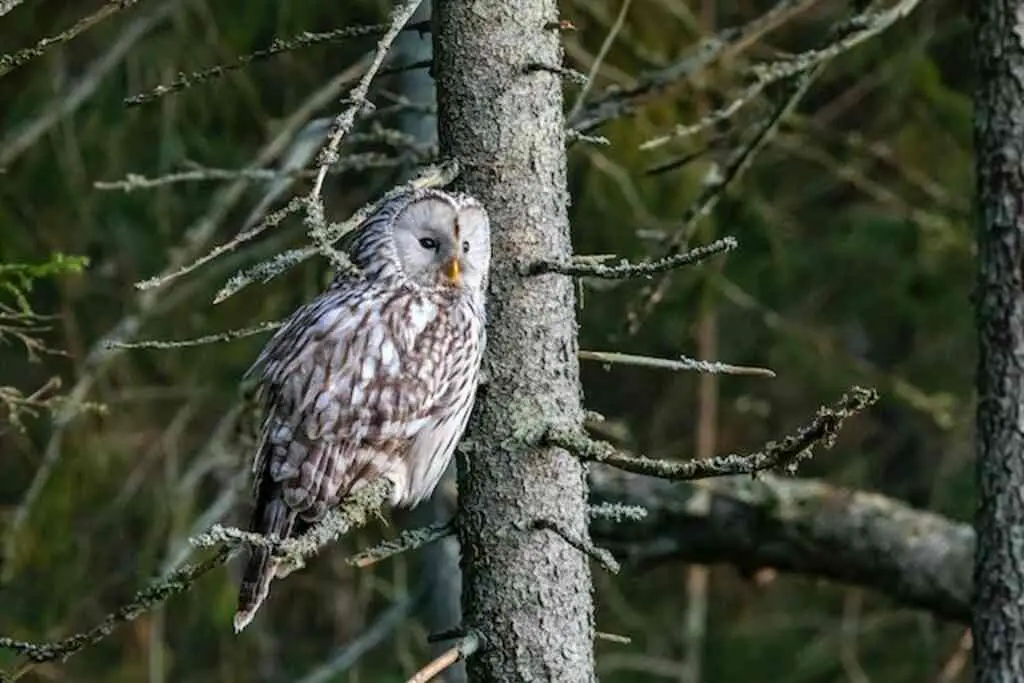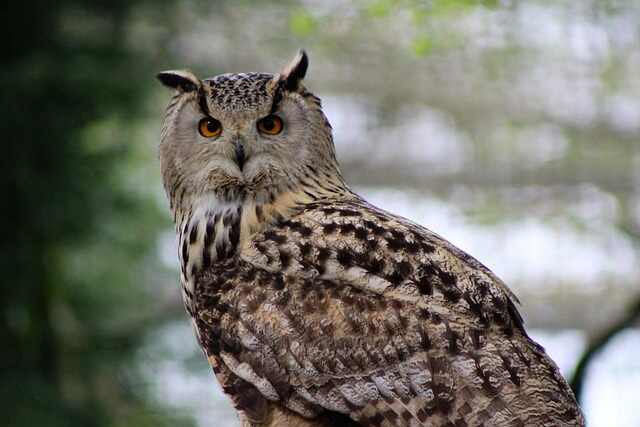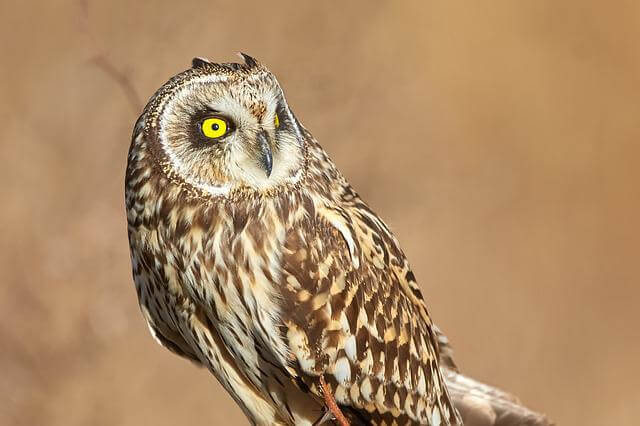Do Owls Eat Skunks? You might be tempted to think not, considering the strong, pungent odor skunks are known for. But prepare to be surprised! As it turns out, owls are not only skilled hunters, but they have a diverse palate as well.
In this article, we’ll explore the answer to this intriguing question and uncover some fascinating facts about owls and skunks. So, let’s dive in!
Table of Contents
Exploring the Possibility of Owls Eating Skunks
Owls are fascinating nocturnal birds of prey that have intrigued people for centuries. They are known for their acute senses, silent flight, and sharp talons. But what do owls eat?
Well, the answer depends on the species and habitat of the owl. Generally speaking, owls have a varied diet that can include small mammals, birds, insects, fish, and even reptiles.
However, some owl species are known to be more selective in their food choices. So it’s only natural to wonder if owls would ever hunt and eat a skunk.
After all, skunks are not your typical prey item for most predators due to their strong odor and defensive behavior.
But then again, owls are skilled hunters with remarkable adaptations that allow them to take down prey much larger than themselves.
So the question remains: Do owls eat skunks? Let’s delve into this fascinating topic and uncover the truth!
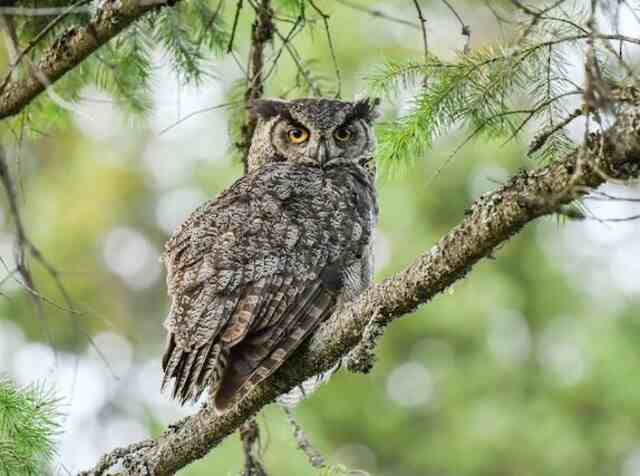
Owls’ Diet Overview
Owls are fascinating creatures that have been the subject of human fascination for centuries. They are known for their silent flight and their ability to see in the dark, but what do they eat?
Owls are carnivorous predators, which means they eat meat. They primarily consume small mammals, birds, and insects as their diet.
Owls are opportunistic hunters that hunt using a combination of sight and sound. Their eyesight is incredibly sharp and allows them to spot prey from great distances.
Additionally, their hearing is finely tuned to detect even the slightest sounds made by potential prey. Owls’ hunting habits depend on the species of owl as well as its location.
Typical Prey of Owls
Owls feed on a wide variety of animals, depending on where they live and what’s available in their habitat. Small mammals such as mice, voles, shrews, rabbits, and squirrels are common prey for most owl species.
Birds such as sparrows, starlings or even other birds of prey can also be a part of an owl’s diet. Insects such as grasshoppers or beetles can also provide sustenance for smaller owls such as screech owls or saw-whet owls.
Some larger owl species can even tackle reptiles like snakes or lizards.
Owl’s Preference for Small Mammals, Birds, and Insects
While owls have diverse diets that vary among species and habitats – one thing remains constant-small mammals such as rodents make up a significant portion of it.
In fact, most experts believe that these furry critters account for at least half, if not more than half-of an average owl’s food intake.
Birds also make up a significant part of some owl species’ diets, with some preferring smaller birds while others go after larger prey.
As mentioned earlier, insects can also provide a meal for some species, but they are not typically the preferred food source.
Overall, owls are fascinating creatures with unique hunting abilities, and their diets reflect their adaptability to different environments and food sources.
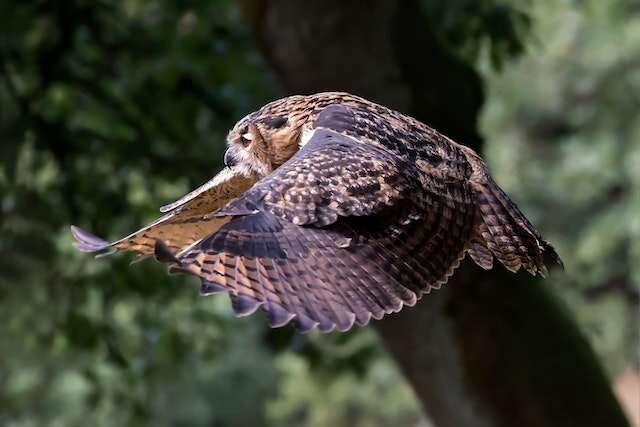
Skunks as Prey
Skunks are fascinating creatures that are notorious for their distinct black and white stripes. They have a reputation for being smelly, but they also possess other unique traits that make them stand out in the animal kingdom.
Skunks are part of the Mustelidae family, which includes badgers, otters, and weasels. They have a lifespan of about three years in the wild and can grow up to two feet long.
Skunks have an omnivorous diet, which includes both plant and animal matter. Some of their favorite foods include insects, small rodents and reptiles.
They can be found in many different habitats throughout North America, including forests, fields, and suburban areas.
Skunks have a unique defense mechanism – their ability to spray foul-smelling liquid from glands located on either side of their anus when threatened or attacked.
Skunk Behavior Description
Skunks are nocturnal animals, which means they come out at night to hunt for food. During the day, they rest in dens, which can be found in hollow logs or burrows dug under shrubs or buildings. Skunks are solitary creatures except during mating season, when males will compete for females’ attention.
When threatened by predators like coyotes or foxes, skunks will first warn their attackers by stamping their feet and arching their backs before spraying them with their noxious odor if necessary.
However, this defense mechanism doesn’t always work against all predators that may attack them.
Are Skunks Commonly Eaten by Owls?
While owls tend to prey on small mammals such as mice and rats along with birds like sparrows or finches, some owl species will eat skunks if given the opportunity.
Great horned owls have been known to hunt skunks, since they have powerful talons that can easily dispatch prey as large as a skunk.
However, not all owl species will eat skunks as they may find the smell too overpowering, or they may prefer other prey that is easier to catch.
Overall, while skunks are not a common prey for owls, some owl species have been known to hunt and eat them.
The choice to hunt a skunk ultimately depends on the owl’s preference and their ability to deal with the skunk’s defense mechanism.
Owl Species that Eat Skunks
There are several species of owls known to eat skunks, including the great horned owl and the barred owl. These two species are common in North America and are known for their impressive hunting skills.
While skunks make up only a small portion of their diet, they are still a viable prey option when other food sources are scarce.
Identifying Owl Species that Eat Skunks
The great horned owl is a large, powerful bird with distinctive ear tufts on its head. It is predominantly brown with white markings and can be found throughout North and South America.
The barred owl, on the other hand, has a rounder head and lacks ear tufts. It is mostly gray-brown with vertical brown stripes on its chest and belly.
Both species have keen senses of sight and hearing, which help them locate their prey in the dark of night. They also have sharp talons, which enable them to capture their prey quickly and efficiently.
| Owl Species | Geographic Range | Skunk Consumption |
|---|---|---|
| Great Horned Owl | North and South America | Known to prey on skunks |
| Eastern Screech-Owl | North America | Occasionally preys on skunks |
| Barred Owl | North America | Rarely preys on skunks |
| Northern Pygmy-Owl | North America | May occasionally prey on skunks |
| Spotted Owl | North America | No evidence of skunk consumption |
| Barn Owl | Worldwide | No evidence of skunk consumption |
Note: It’s important to remember that even if a particular owl species is known to consume skunks, it is not their primary food source. Owls are opportunistic hunters and their diet can vary depending on their geographical range and seasonal availability of prey.
How Owls Hunt and Consume Skunks
When hunting skunks, owls typically swoop down from above or ambush them from behind. They use their talons to grab the skunk by the shoulders or back of the neck to avoid getting sprayed by its defensive odor.
Once captured, owls will often pluck off fur or feathers before consuming their prey whole. The indigestible parts such as bones, fur, and feathers are then regurgitated in pellets that can be found around roosting areas.
It’s interesting to note that while skunks may seem like an unappetizing choice for many predators due to their potent spray defense mechanism, owls have developed strategies for avoiding this obstacle when hunting these animals.
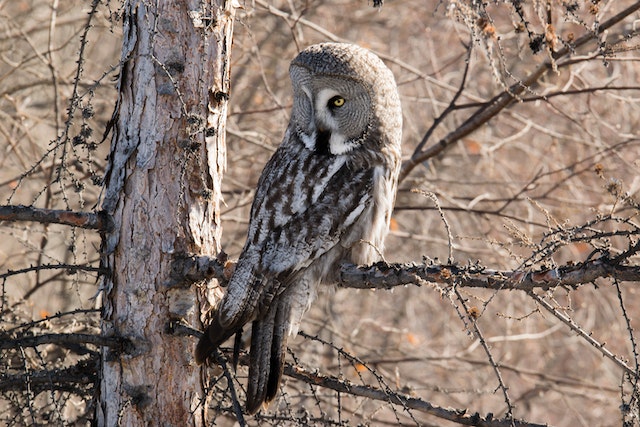
Why Some Owls Don’t Eat Skunks
Reasons for Some Owl Species to Avoid Skunks
While some owl species have been observed to hunt and eat skunks, others seem to avoid them altogether. There could be a number of reasons for this.
One possible reason is that skunks are notorious for their strong smell, which may make them an unappealing prey item for certain owl species.
Another possibility is that skunks are known to spray a noxious liquid when threatened, which could pose a risk to an owl’s safety.
Additionally, owls tend to hunt prey that is most abundant in their environment and requires the least amount of effort to capture.
If there are other prey items readily available that are easier or more nutritious for the owl, they may choose those over hunting a skunk.
It’s also worth noting that different species of owls have different dietary preferences and hunting strategies, so what works for one species may not work for another.
Factors Influencing Owl’s Skunk Hunting Decision
Despite the potential risks and difficulties associated with hunting skunks, there are still some factors that could prompt an owl to go after this particular prey item.
For example, if alternative food sources become scarce or unavailable due to changes in environmental conditions (such as drought or forest fires), an owl might be more likely to take on riskier prey options like skunks.
Another factor that could influence whether an owl decides to hunt a skunk is its level of experience and skill as a hunter.
Younger or less experienced owls might be less likely to attempt hunting something as challenging as a skunk compared with older or more experienced individuals who have developed better techniques for capturing difficult prey items.
Overall, while it’s clear from evidence that some owl species do occasionally hunt and consume skunks, there are a variety of reasons why other species may avoid this type of prey.
Ultimately, the decision to hunt a skunk comes down to a combination of factors including the owl’s dietary preferences, hunting skills, and the availability of alternative food sources in their environment.
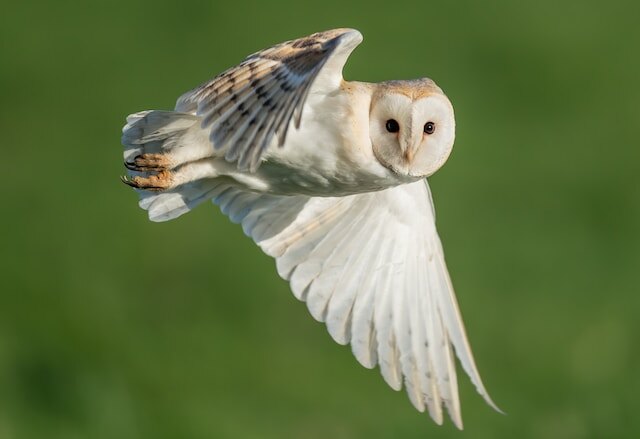
Conclusion
After discussing the diet of owls and the behavior of skunks, we can finally answer the question: do owls eat skunks? The answer is yes, some owl species do consume skunks as a part of their diet.
However, it is not a common prey for all owl species. Owls are known to have a diverse diet that includes small mammals, birds, and insects.
While they may hunt skunks occasionally, it is not their preferred choice of prey. In fact, some owl species might avoid hunting skunks due to their strong odor or defensive behavior.
While owls may eat skunks from time to time, it is not a common occurrence among all owl species. Understanding the dietary habits and preferences of owls can help us better appreciate these fascinating creatures and their role in ecosystems around the world.
FAQs: Do Owls Eat Skunks?
Do owls eat skunks?
Yes, some species of owls have been known to eat skunks as part of their diet, including great horned owls and barred owls. However, it is not a common prey item for most owls due to the skunk’s defensive spray.
How do owls hunt skunks?
Owls hunt skunks in the same way they hunt other prey, using their sharp talons and beaks to grab and kill them. However, they will often approach skunks cautiously, trying to avoid getting sprayed.
What other animals are part of an owl’s diet?
Owls are carnivores and their diet can include a wide variety of animals such as rodents, birds, insects, fish, and reptiles, depending on the species and habitat.
Can skunks defend themselves against owls?
Yes, skunks have a potent defensive spray that they can use to deter predators, including owls. If an owl is sprayed, it can cause temporary blindness and respiratory distress.
Are skunks a common prey item for owls?
No, skunks are not a common prey item for most owl species, due to the skunk’s defensive spray. Owls will generally only hunt skunks if other food sources are scarce.
What are some other predators of skunks?
Skunks have a few natural predators, including coyotes, foxes, and bobcats. Birds of prey such as eagles and hawks may also hunt skunks, but they are less likely to do so due to the skunk’s defensive spray.

